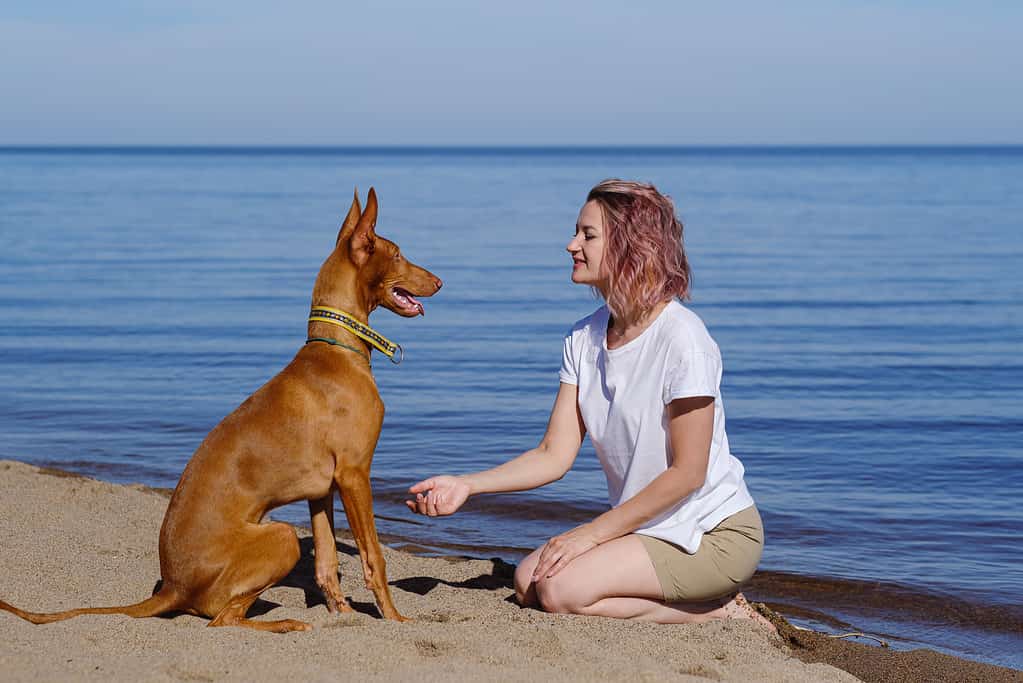Pharaoh hounds were once almost extinct. However, thanks to some dedicated breeders, they are slowly making a comeback. Today, you can find several Pharaoh hound breeders throughout the United States.
With the rise in their popularity, you may be wondering if this breed is a good fit for your family. We’ll cut straight to the case – these dogs work best in a very active family without small children. They’re a bit emotionally sensitive, which can make them overwhelmed around toddlers and loud noises.
We’ll go over some of these dogs’ major temperament traits below. Remember, temperament is a very individual thing. Socialization and individual breeding lines can greatly affect a dog’s temperament. While this article will apply to most Pharaoh hounds, some may have different traits.
Playful
Pharaoh hounds are very playful. They love to run around, and playing fetch is one of their favorite activities. If you can find somewhere for lure-coursing (check with your local dog club), these dogs can really stretch their legs. They are always looking for something fun to play!
If you’re active, their activity level will let you take them hiking and running. They’re a great dog if you spend several hours a day outside exercising.
We recommend them for homes with a fenced-in yard, as they need to run around off-leash several times a day. (And you won’t be able to keep up with them, so going on runs won’t let them really kick it into high gear. That said, some people do train them to run alongside bikes, which can be helpful in meeting this need.)
Independent

Start training early with this breed and continue with regular sessions throughout their lives. They can quickly become lazy with obedience, so regular practice is important.
©Mikhail Spaskov/iStock via Getty Images
Pharaoh hounds were bred to chase things. They weren’t bred to listen to their owners or be very obedient. They’re a pretty different sort of dog from the Labrador Retriever or German Shepherd most people are used to. These dogs aren’t really concerned with making you happy.
That said, they can be trained (and should be). Just don’t expect them to listen to you above all else. They’re known for bracing their legs and refusing to move if they don’t want to walk. If they see something running, they will chase it – even if you say not to.
Therefore, you must train them consistently and from an early age. Puppy obedient classes are exceptionally important. These classes help with socialization and training, making them doubly effective for these dogs.
Sensitive
Pharaoh hounds are known fo being very sensitive. They can quickly pick up on tension in a home, and they just can’t handle it. They’re prone to anxiety of all sorts. Without treatment, anxiety can lead to problem behaviors like barking, improper urinating, and chewing. They’ll look for ways to handle their anxiety, which usually are not behaviors you want them to do!
In some cases, they may even end up sick to their stomachs. Pharaoh hounds are notorious for becoming “sick” for seemingly no reason. They may even develop neurotic behaviors, like running in circles.
These dogs need a peaceful home. Therefore, we only recommend them for homes without small children (especially toddlers). The quick movements and loud shouts of children can cause stress and shyness.
Furthermore, pharaoh hounds are often touch-sensitive. They easily get overwhelmed when cuddled excessively. In some cases, they may not even like to be petted as much as you’d expect a dog to. Most would rather sit near you but without touching you. If you’re looking for a cuddly breed, a pharaoh hound isn’t a good option for you.
In many cases, we recommend relying on verbal praise – not petting. Pharaoh hounds may see petting as more of something they put up with than a reward. When training, keep this in mind.
Observant

Take your pharaoh hound out of the house as much as possible, especially when they’re younger.
©Eudyptula/iStock via Getty Images
Usually, sighthounds are pretty friendly. However, pharaoh hounds are different. They’re exceptionally alert and often cautious of strangers. Therefore, they can make pretty good watchdogs under the right circumstances.
Of course, this also means that more socialization is necessary. Without it, they can quickly become too cautious and shy. While outright aggression isn’t common, they may bite if threatened by a stranger or cornered. Even if you don’t think the dog is being threatened, a shy pharaoh hound can interpret innocent actions as threats (especially if they’re already anxious).
Socialization is important. This is one reason we recommend puppy classes. They provide an introduction to training, which these dogs need, and plenty of socialization. That said, don’t rely on puppy classes solely for your puppy’s socialization needs, but they can be a nice addition to your socialization schedule.
Ready to discover the top 10 cutest dog breeds in the entire world?
How about the fastest dogs, the largest dogs and those that are -- quite frankly -- just the kindest dogs on the planet? Each day, AZ Animals sends out lists just like this to our thousands of email subscribers. And the best part? It's FREE. Join today by entering your email below.
Thank you for reading! Have some feedback for us? Contact the AZ Animals editorial team.








